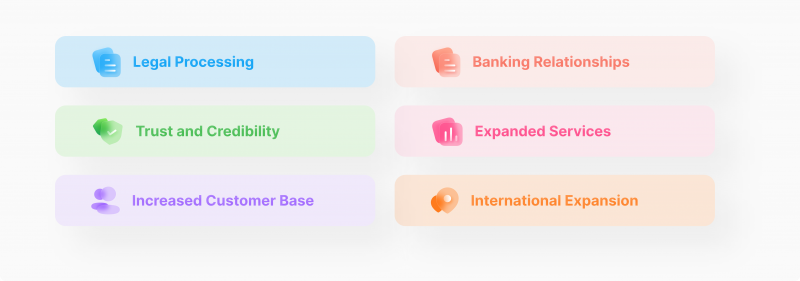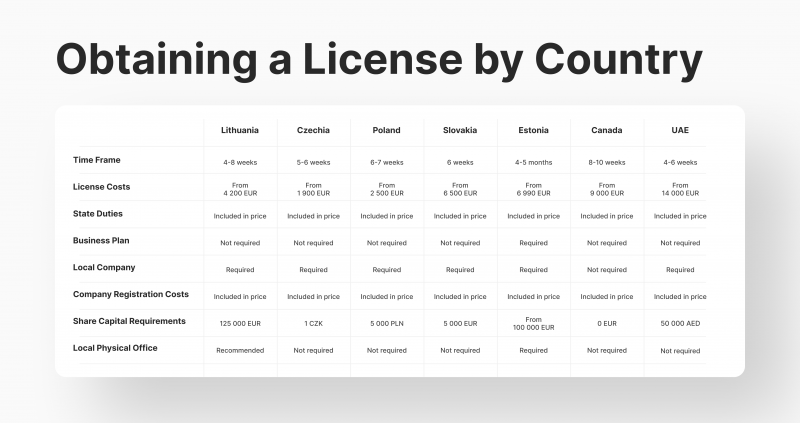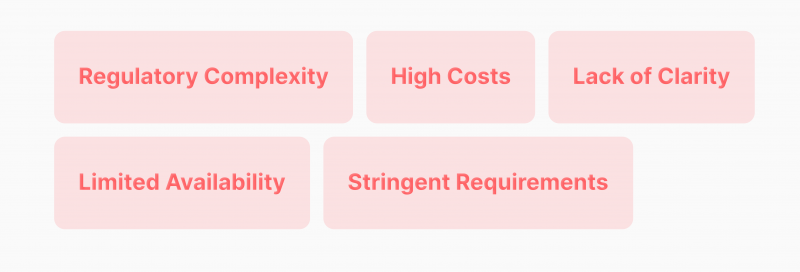What is a Crypto Exchange License, and Why Do You Need it?

The advent of cryptocurrencies heralded a new era of financial innovation, with digital currencies rapidly gaining favor with both investors and consumers.
In this piece, we’ll look into what makes the crypto business and exchanges unique and why having a cryptocurrency license is crucial.
We will also cover the process of obtaining a crypto exchange license and offer guidance to individuals who are new to the complex world of cryptocurrency legislation.
Key Takeaways
- A crypto license is legal authorization for a crypto business to operate a cryptocurrency exchange.
- Crypto businesses and exchanges need a license to comply with relevant laws and regulations, establish customer trust, and expand their services.
- Obtaining a cryptocurrency license is complex and varies by country, requiring businesses to meet stringent requirements such as financial stability, cybersecurity measures, and compliance with relevant laws and regulations.
What is a Cryptocurrency License?
A cryptocurrency license is a legal document that grants businesses permission to operate in the cryptocurrency market. It is issued by regulatory agencies responsible for overseeing financial operations in their respective countries.
Each business engaging in crypto-related activities must have the appropriate license. It guarantees that the crypto company itself can safeguard its customers’ crypto assets and abides by applicable laws. Exchange, wallet, and custodian licenses are just a few examples of the many sorts of crypto licenses available, and the criteria for acquiring one might vary widely from country to country.
Benefits of Obtaining a Crypto Exchange License
Running an unlicensed cryptocurrency exchange is a risky business, both legally and monetarily, and becoming licensed comes with a pack of advantages. This section will highlight several benefits of being regulated.

Legal Compliance
One of the most important reasons to obtain crypto regulation is to avoid getting in trouble with the law. Cryptocurrency exchanges are part of a highly regulated industry with high risks for noncompliance.
Without a valid crypto exchange license, exchanges may be subject to legal action, resulting in significant fines and even business closure. A license guarantees compliance with all applicable rules and regulations, allowing businesses to operate lawfully without fear of legal ramifications.
Trust and Credibility
Having a crypto exchange license also helps establish the company as a reliable and trustworthy entity in the eyes of customers. Consumers are more likely to use an exchange’s services after learning that the company holds a valid license, as this shows that the exchange is legitimate and that their money is protected.
The legitimacy of the cryptocurrency exchanges is boosted because a license shows the company has passed a rigorous regulatory inspection.
Increased Customer Base
An authorized cryptocurrency trading platform is more likely to draw in new customers, which is good for business. With the proper authorization, a trading platform can promote its offerings to a wider audience. Ultimately, consumers are more likely to utilize the exchange’s services since they view it as a respectable and trustworthy company.
Have a Question About Your Brokerage Setup?
Our team is here to guide you — whether you're starting out or expanding.
Banking Relationships
A license for cryptocurrency exchanges can also facilitate banking partnerships. Because of the perceived risks involved in crypto activities, many banks are hesitant to work with enterprises in the cryptocurrency market by providing financial services to such entities. Yet, establishing credibility with banks and securing a banking link is essential to the success of any cryptocurrency exchange.
Expanded Services
Businesses that have been granted permission to operate as virtual asset service providers might expand their product offerings to provide services that meet the needs of their clientele. Licensed exchanges, for instance, may advertise fiat currency-to-cryptocurrency conversion services and some other crypto services, thereby broadening their customer base and perhaps raising their revenue.
Moreover, regulated exchanges can offer other services like margin trading, futures trading, and more, increasing their product line and customer base as a result.
International Expansion
The ability to conduct business on a global scale is another benefit of obtaining a crypto exchange license. Having a license from a credible regulatory authority can make it easier to secure licenses in other countries, many of which require exchanges to be licensed to operate in their jurisdiction.
With legal support and the right license in hand, businesses can take their offerings global, resulting in more customers and more money.
How Obtaining a Crypto Exchange License Varies Depending on the Country
The steps required to secure a crypto exchange license can differ greatly from one jurisdiction to the next.
Every nation has its own set of rules and regulations for businesses in the cryptocurrency sector to follow. There are countries with stringent rules and others with more lenient policies that make it simpler for businesses to obtain a crypto exchange license. In some instances, countries may have varying regulations for crypto-related activity, making it impossible for enterprises to operate legally.
Therefore, companies must research the regulatory framework in their respective countries and consult with legal experts to make a business plan to ensure compliance with local regulations.
Here’s a quick breakdown of licenses and conditions by country and region.

How to Get a Сrypto Exchange License: Steps and Guide
Depending on the jurisdiction and the kind of cryptocurrency operations, business objectives and the license being sought, the application form and procedure for obtaining a crypto license might be lengthy and involved. Nevertheless, the following are the general procedures a business might take to acquire a cryptocurrency license.

Understand the Regulatory Framework
Prior to applying for a license, it is vital to comprehend the regulatory framework of the country in which the business operates. This and appropriate knowledge will help guarantee that the company follows all applicable regulations.
Prepare the Application
After comprehending the regulatory environment, the following stage for a business is to draft the licensing application. Often, the application will necessitate in-depth information about the company, further information such as its ownership structure, business plan, financial situation, anti-money-laundering, and know-your-customer policies and processes. The application is then submitted to the appropriate regulatory body for consideration. Depending on the complexity of the application and the availability of the required documents from the relevant regulatory agency, the review process can take several weeks or even months.
Compliance and Due Diligence
Once the application has been accepted, the company has an ongoing obligation to adhere to regulatory criteria and conduct the necessary due diligence. To guarantee ongoing compliance with applicable rules and regulations, this may involve periodic reporting, audits, and inspections.
Overall, getting a cryptocurrency license is essential for any organization seeking to engage in the crypto market. To get a license and lawfully operate in the fascinating and rapidly evolving world of cryptocurrency transactions, businesses need to understand the regulatory environment, prepare their applications thoroughly, and maintain a high level of compliance and due diligence.
Challenges to Acquiring a Crypto Exchange License
Although there are a lot of upsides to becoming licensed as a cryptocurrency exchange, getting one is not easy. There are a number of challenges that companies must overcome in order to obtain a license. Let’s examine what obstacles may stand in the way of obtaining a crypto license.

Regulatory Complexity
The regulatory landscape for cryptocurrencies is complex and constantly evolving. Regulations vary by country, and businesses must comply with the laws and regulations of each country in which they operate. This complexity makes it challenging for businesses to navigate the regulatory environment and obtain a license.
Moreover, the regulatory requirements for obtaining a license can be stringent, and businesses must demonstrate compliance with all relevant laws and regulations to obtain a license.
High Costs
Getting a cryptocurrency license to operate such services as a cryptocurrency exchange can be costly, particularly for smaller businesses. License fees can vary widely from country to country, but large sums of money may be required in some cases, and businesses should be prepared to foot the bill. Additionally, licensed enterprises must also spend substantial continuing compliance costs due to the necessity of maintaining compliance with all applicable rules and regulations.
Discover the Tools That Power 500+ Brokerages
Explore our complete ecosystem — from liquidity to CRM to trading infrastructure.
Stringent Requirements
The standards for acquiring a crypto license to operate a cryptocurrency exchange can be demanding, and organizations must satisfy all of them to obtain a license. Anti-money-laundering (AML) and know-your-customer (KYC) requirements, for instance, necessitate the collection and verification of client information and must be followed by enterprises that wish to obtain a license.
Additionally, organizations that offer payment services and wish to obtain a license must demonstrate financial stability, protect the security of consumer cash and personal assets, and keep up with the latest cybersecurity best practices.
Limited Availability
Crypto exchange licenses are not widely available, and the number of regulatory bodies offering licenses is limited. This limited availability can make it challenging for businesses to obtain a cryptocurrency exchange license, especially in countries where licenses are still in short supply. Moreover, some regulatory bodies have limited the number of licenses they issue, which can lead to increased competition and more challenging cryptocurrency licensing requirements, not only due to the process.
Lack of Clarity
The need for clarity in regulatory requirements can make it challenging for businesses to obtain a crypto exchange license. Regulations can be ambiguous, and there may be a need for more clarity on interpreting and implementing them. This lack of clarity can lead to delays in the licensing and registration application process and make it more challenging for businesses to comply with regulations.
The Bottom Line
Obtaining a crypto exchange license is crucial for businesses looking to operate legally and establish trust with their customers. While acquiring a license can be complex and challenging, the benefits of obtaining one are significant.
By understanding the regulatory landscape, complying with relevant laws and regulations, and meeting the requirements of the licensing body, businesses can successfully obtain a license and enjoy the benefits of increased customer trust, expanded services, and legal compliance.
As the crypto industry continues to evolve, obtaining a license will become even more critical, and businesses that invest the time and resources to do so will be well-positioned for success in the years ahead.
FAQ
How do you get a cryptocurrency license?
The process of obtaining a cryptocurrency license varies by country but generally involves meeting stringent requirements such as financial stability, cybersecurity measures, and compliance with relevant laws and regulations.
In which country is it easy to get a crypto license?
Malta is often considered one of the easiest countries to obtain a cryptocurrency license, as it has a favorable regulatory environment for cryptocurrencies and blockchain technology.
Do I need a license to operate a crypto exchange?
In most countries, a license is required to operate a crypto exchange. This ensures compliance with relevant laws and regulations, establishes trust with customers, and expands services.
What are the challenges of cryptocurrency?
Challenges of cryptocurrency include regulatory uncertainty, security risks, volatility, lack of standardization, and technical issues such as scalability and interoperability.
What is the disadvantage of cryptocurrency regulation?
Disadvantages of cryptocurrency regulation include
- The potential stifling of innovation.
- Limiting access to certain markets.
- Imposing additional costs on businesses to comply with regulations.









